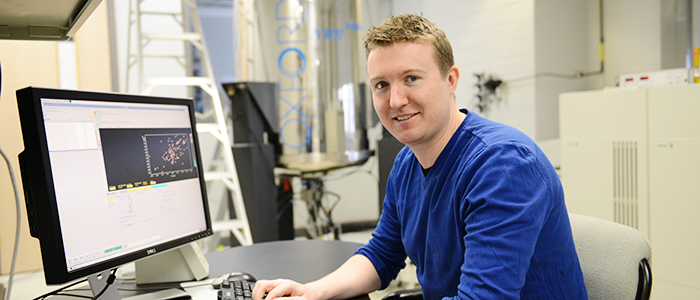Born to Research

You could say that Don Spratt, PhD, postdoctoral fellow at Schulich Medicine & Dentistry was born into higher education. He came into this world as his parents were pursuing their own graduate degrees. Growing up, the academic environment in which he lived served as an inspiration. With 17 publications, including a paper in Nature Communications, it is clear that a life of research was meant to be.
Following his undergraduate studies at Mount Alison University, Spratt signed on to do his master's degree, transferring to the PhD degree program soon after. Working under J. Guy Guillemette, PhD, at the University of Waterloo, Spratt studied the structure and function of nitric oxide synthase, the enzyme responsible for making a small free radical molecule involved in signalling, vasodilation, and immune defense within the body.
His thesis, "Calmodulin Binding and Activation of Mammalian Nitric Oxide Synthases" focused on trying to understand how the protein calmodulin binds to the nitric oxide synthase and modulates the activity of the enzyme. His work resulted in 12 publications, an invited review, and the University of Waterloo Pearson Medal for the top Chemistry PhD thesis.
Not one to slow down, Spratt began thinking about his future work and a postdoctoral placement.
He connected with Gary Shaw, PhD, professor, Canada Research Chair in Structural Neurobiology, and director of the Biomolecular Nuclear Magnetic Resonance (NMR) Laboratory at Western. Within a week he had a signed contract with Shaw, making a new home at the Schulich School of Medicine & Dentistry in September 2008.
“When I came down for a lab tour and interview, Gary and I hit it off well, the people in his lab were very welcoming, and the facilities looked great. I have been in his lab for just over five years now, and Gary is a great supervisor. I see how he works and how effective he is at his job. I couldn’t have asked for a better mentor. I know I made the right choice to come and work at Western”, he said.
While completing his postdoctoral fellowship, Spratt is focusing on examining protein-protein interactions in the ubiquitylation-signaling pathway using NMR spectroscopy.
“If the ubiquitylation process malfunctions and the protein turnover in the cell is impaired, cells can grow and multiply uncontrollably, a common trait in many cancers. Alternatively, misfolded proteins can also aggregate which can contribute to the development of neurodegenerative diseases, such as Parkinson’s disease.”
Since joining Shaw’s lab, Spratt has published five papers and one invited review. He currently has two other manuscripts under review.
Most recently, Spratt, along with Shaw and a number of other researchers, published a paper, “A molecular explanation for the recessive nature of parkin-linked Parkinson’s disease” in Nature Communications.
“We looked at a gene called PARK2 which codes for the E3 ubiquitin ligase ‘parkin’. Mutations in this gene are directly linked to autosomal recessive Parkinson’s disease, so people who have mutations in both copies of this gene have a high probability of developing Parkinson’s before the age of 40.
"We determined the structure of the catalytic domain for parkin, and we can now explain how substitutions in this region of parkin contribute to ubiquitylation dysfunction and how the disease can progress”.
Spratt lists his paper on parkin as a career highlight. “To be among the first people to find things no one has ever seen before and to spread the word about why the finding is important is pretty cool". With the parkin paper, we were cited in a couple of reviews and we were highlighted on the Michael J. Fox Foundation for Parkinson’s Research web site.”
When he’s not in the lab, Spratt enjoys curling, and often joins Shaw at the rink. He also plays guitar, both acoustic and electric, and spends time with his wife and his four-year old daughter.
Not surprisingly, Spratt has already thought about his future research plans.
Ideally, he would like to set up his own lab continuing his research interests focusing on understanding the molecular basis of human diseases, particularly the biochemical causes of cancer. He’d also love the opportunity to supervise and mentor his own graduate students.
“I like doing research, but I like working with students as well and paying it forward. That is how you get more scientists out there, to find out more answers to biological questions that no one presently knows. It is rewarding to see something click in the students, watch them become self-sufficient and grow into their own.”








